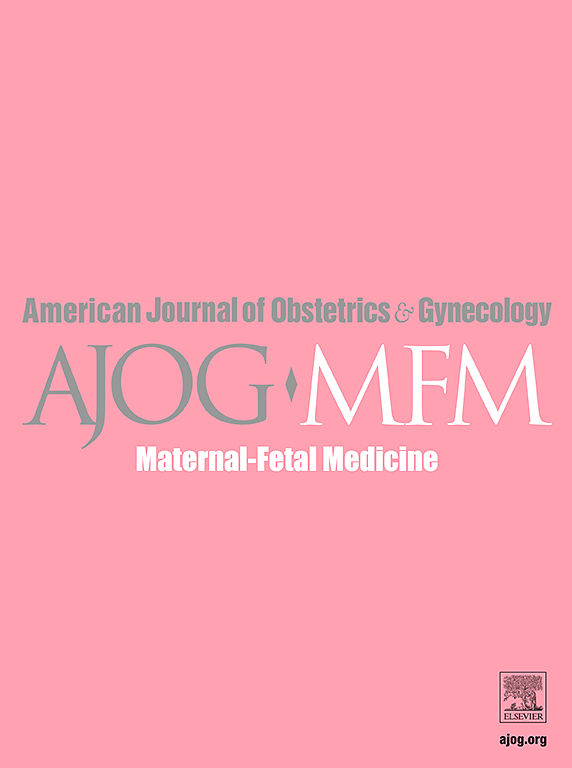产前血栓预防的住院药物治疗:基于风险的血栓预防论证:基于风险的产前血栓预防。
IF 3.8
2区 医学
Q1 OBSTETRICS & GYNECOLOGY
American Journal of Obstetrics & Gynecology Mfm
Pub Date : 2025-03-01
DOI:10.1016/j.ajogmf.2024.101567
引用次数: 0
摘要
在美国,静脉血栓栓塞症是导致孕产妇发病和死亡的一个重要原因。与未住院的产科患者相比,孕期因常规分娩以外的原因住院(即产前住院)的患者罹患 VTE 的风险更高,但对于哪些患者应在产前住院期间接受血栓预防治疗尚未达成共识,因为绝对事件发生率较低,且抗凝治疗会使产前管理复杂化。我们认为,以个体化患者风险评估为依据的方法可能会为患者带来最大的净收益。这种方法可以避免在 VTE 绝对风险较低的患者中普遍使用药物预防的弊端(可能会影响计划外分娩或接受神经麻醉)。相比之下,不对所有产前患者进行药物预防的方法可能会使部分患者面临 VTE 的重大风险。我们概述了反对普遍药物血栓预防和反对普遍避免药物血栓预防的论点,并讨论了我院提出的基于风险的方法。最后,我们概述了确定最佳产前抗凝策略的研究议程。本文章由计算机程序翻译,如有差异,请以英文原文为准。
Inpatient pharmacological thromboprophylaxis in the antepartum period: an argument for risk-based thromboprophylaxis
Venous thromboembolism (VTE) is a significant cause of maternal morbidity and mortality in the United States. People hospitalized during pregnancy for reasons other than routine birth (ie, during antepartum admissions) are at increased risk of VTE compared with nonhospitalized obstetric patients, but there is no consensus regarding which patients should receive thromboprophylaxis during antepartum hospitalizations as the absolute event rates are low and anticoagulation can complicate antepartum management. We argue that an approach informed by individualized patient risk assessment is likely to produce the greatest net benefit for patients. Such an approach would avoid the pitfalls of universal pharmacologic prophylaxis (potential to interfere with unplanned delivery or receipt of neuraxial anesthesia) among patients for whom the absolute risk of VTE is low. In contrast, approaches that withhold pharmacologic prophylaxis from all antepartum patients likely place some at significant risk of VTE. We outline the arguments against universal pharmacologic thromboprophylaxis and against universal avoidance of pharmacologic thromboprophylaxis and discuss a risk-based approach proposed at our institution. Finally, we outline a research agenda for identification of optimal antepartum anticoagulation strategies.
求助全文
通过发布文献求助,成功后即可免费获取论文全文。
去求助
来源期刊

American Journal of Obstetrics & Gynecology Mfm
Medicine-Medicine (all)
CiteScore
7.40
自引率
3.20%
发文量
254
审稿时长
40 days
期刊介绍:
The American Journal of Obstetrics and Gynecology (AJOG) is a highly esteemed publication with two companion titles. One of these is the American Journal of Obstetrics and Gynecology Maternal-Fetal Medicine (AJOG MFM), which is dedicated to the latest research in the field of maternal-fetal medicine, specifically concerning high-risk pregnancies. The journal encompasses a wide range of topics, including:
Maternal Complications: It addresses significant studies that have the potential to change clinical practice regarding complications faced by pregnant women.
Fetal Complications: The journal covers prenatal diagnosis, ultrasound, and genetic issues related to the fetus, providing insights into the management and care of fetal health.
Prenatal Care: It discusses the best practices in prenatal care to ensure the health and well-being of both the mother and the unborn child.
Intrapartum Care: It provides guidance on the care provided during the childbirth process, which is critical for the safety of both mother and baby.
Postpartum Issues: The journal also tackles issues that arise after childbirth, focusing on the postpartum period and its implications for maternal health. AJOG MFM serves as a reliable forum for peer-reviewed research, with a preference for randomized trials and meta-analyses. The goal is to equip researchers and clinicians with the most current information and evidence-based strategies to effectively manage high-risk pregnancies and to provide the best possible care for mothers and their unborn children.
 求助内容:
求助内容: 应助结果提醒方式:
应助结果提醒方式:


